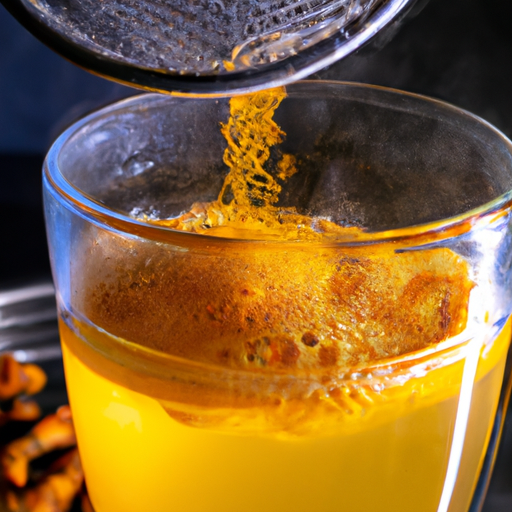Imagine this: holding a cozy cup of turmeric tea, helping to relax you and offering various health advantages. However, there’s a lingering concern as you drink it: could this bright yellow drink cause stains on my teeth?
It’s a valid concern, as we all want to maintain a bright, confident smile. In this article, we will explore the truth behind whether turmeric tea stains your teeth yellow.
To answer this question, we must delve into the composition of turmeric tea and its potential staining properties. We will also compare it to other staining beverages and assess its impact on enamel health.
Additionally, we will provide tips on preventing stains from turmeric tea and discuss whether brushing alone is enough to remove them. Furthermore, we will explore professional teeth whitening options and natural remedies for teeth whitening.
Finally, we will address the myth or fact surrounding turmeric tea as a teeth whitening method. So, let’s embark on this journey together and uncover the truth about turmeric tea and its effect on the brightness of our smiles.
Key Takeaways
- Turmeric tea stains teeth less than coffee and red wine due to its lower concentration of staining compounds.
- Using a straw when drinking turmeric tea can minimize contact with teeth and reduce staining.
- Turmeric capsules or supplements can be alternatives to turmeric tea to avoid stains.
- Professional teeth whitening options can effectively remove stains caused by turmeric tea.
Understanding the Composition of Turmeric Tea
Do you ever wonder what makes turmeric tea so vibrant and potentially staining for your teeth? Turmeric tea derives its distinctive bright yellow color from the compound called curcumin, which is found in the turmeric root. Curcumin is known for its antioxidant and anti-inflammatory properties, making turmeric tea a popular choice for promoting overall health.
However, it’s important to be aware of potential side effects. One such side effect is the potential staining of teeth. The intense yellow pigments in turmeric can adhere to the enamel, leading to yellow discoloration over time. This staining effect can be exacerbated by factors such as poor oral hygiene or consumption of highly pigmented foods and beverages.
In the next section, we’ll further examine the staining properties of turmeric and discuss ways to minimize its impact on teeth health.
## Examining the Staining Properties of Turmeric
When you enjoy a soothing cup of turmeric-infused brew, you might notice an intriguing change in the color of your pearly whites. Turmeric, known for its vibrant yellow pigment, has the potential to stain teeth due to its natural dye properties. However, the staining effect of turmeric tea on teeth varies depending on several factors, such as the concentration of turmeric used, the duration of exposure, and individual oral hygiene habits. To understand the staining properties of turmeric better, let’s take a look at the following table:
| Factors Affecting Staining | Effect on Teeth |
| ————————- | ————— |
| Concentration of Turmeric | Higher concentration increases the likelihood of staining |
| Duration of Exposure | Longer exposure time can intensify the staining effect |
| Individual Oral Hygiene | Proper oral hygiene practices can help prevent or minimize staining |
Despite its potential to stain teeth, it’s important to note that turmeric tea also offers various benefits, such as its anti-inflammatory and antioxidant properties. To enjoy the positive effects while minimizing staining, maintaining good oral hygiene and regular dental check-ups are essential. Now, let’s delve into comparing turmeric tea to other staining beverages.
## Comparing Turmeric Tea to Other Staining Beverages
If you indulge in beverages like coffee or red wine, you may notice a striking difference in the appearance of your teeth compared to when you enjoy turmeric-infused brew. Here is a comparison between turmeric tea and other staining beverages:
1. Turmeric tea vs coffee: which stains teeth more?
– Turmeric tea contains natural pigments called curcuminoids, which can potentially stain teeth. However, coffee contains more intense staining compounds like tannins and polyphenols, making it more likely to cause discoloration.
2. How to remove turmeric stains from teeth:
– Good oral hygiene practices like brushing and flossing can help prevent and remove stains. Additionally, using whitening toothpaste or seeking professional dental cleaning can reduce the appearance of turmeric stains.
Turmeric tea’s impact on enamel health will be discussed in the subsequent section.
## Impact of Turmeric Tea on Enamel Health
Protect your pearly whites and savor the benefits of turmeric tea without worrying about its impact on the strength of your enamel. Research suggests that while turmeric tea may stain your teeth temporarily, it does not cause enamel erosion or long-term damage. To understand this further, let’s take a closer look at the impact of turmeric tea on enamel health.
Enamel, the outermost layer of our teeth, is the hardest substance in our bodies. It protects our teeth from decay and damage. A study comparing the effects of turmeric tea to other staining beverages on enamel found that turmeric tea had the least impact on enamel erosion. In fact, it was even less erosive than coffee and black tea.
So, enjoy your cup of turmeric tea knowing that it is unlikely to cause any significant harm to your enamel. In the next section, we will explore some tips for preventing stains from turmeric tea.
## Tips for Preventing Stains from Turmeric Tea
To keep your smile bright while enjoying the benefits of turmeric tea, try these simple tips for preventing any potential discoloration. First, consider using a straw when drinking turmeric tea. By sipping through a straw, you can minimize contact between the tea and your teeth, reducing the chances of staining.
Another option is to drink your turmeric tea at a cooler temperature. Hot liquids can increase the likelihood of stains, so letting your tea cool down a bit can help.
Additionally, you may want to alternate between turmeric tea and other beverages. By mixing things up, you can give your teeth a break from the staining effects of turmeric.
Finally, if you’re concerned about stains, you can explore turmeric tea alternatives such as turmeric capsules or supplements.
Transitioning into the subsequent section, let’s now discuss whether brushing alone is enough to remove turmeric stains.
## Is Brushing Enough to Remove Turmeric Stains?
Brushing alone may not be enough to remove turmeric stains from your teeth. While brushing is important for oral hygiene, turmeric stains can be stubborn and require additional measures. Here are four alternative teeth whitening methods to consider:
1. Oil pulling: Swishing coconut or sesame oil in your mouth for 10-15 minutes can help remove stains and promote oral health.
2. Baking soda and hydrogen peroxide paste: Mixing these ingredients into a paste and gently brushing your teeth with it can lighten stains.
3. Activated charcoal: Applying activated charcoal to your teeth and rinsing thoroughly can absorb stains and whiten your smile.
4. Lemon juice and salt scrub: Mixing lemon juice and salt to create a scrub can exfoliate your teeth and reduce the appearance of stains.
While these alternative methods can be effective, professional teeth whitening options may provide more immediate and dramatic results.
## Professional Teeth Whitening Options
One option for achieving a brighter smile is through the utilization of professional teeth whitening methods. These methods are effective in removing stains caused by turmeric tea and can significantly improve the whiteness of your teeth. There are various professional teeth whitening options available, including in-office treatments and take-home kits. In-office treatments are typically more expensive, ranging from $500 to $1,000, but they provide immediate results and are performed by dental professionals. Take-home kits, on the other hand, are more affordable, usually ranging from $100 to $400, but they may take longer to achieve desired results. It is important to consult with a dentist to discuss which option is best for you based on your budget and desired outcome. Transitioning into the subsequent section about natural remedies for teeth whitening, there are also alternative methods that can be explored.
## Natural Remedies for Teeth Whitening
If you’re looking for a natural way to brighten your smile, you’ll be amazed to learn that certain fruits like strawberries can actually whiten teeth by breaking down surface stains. In fact, studies have shown that the malic acid found in strawberries can help remove discoloration and improve the overall whiteness of your teeth.
Using natural ingredients and home remedies for teeth whitening is a popular option for those who prefer a more holistic approach. Here are three effective options to consider:
– Baking Soda: This common household ingredient has mild abrasive properties that can gently scrub away stains on the surface of your teeth.
– Coconut Oil Pulling: Swishing coconut oil in your mouth for 10-15 minutes a day can help remove plaque and surface stains, leading to a brighter smile.
– Apple Cider Vinegar: Although it may seem counterintuitive to use an acidic substance, apple cider vinegar can help remove stubborn stains. However, be cautious as excessive use may erode tooth enamel.
These natural remedies offer a convenient and cost-effective way to achieve a whiter smile without the use of harsh chemicals. However, it’s important to separate fact from fiction when it comes to teeth whitening methods. Is turmeric tea really an effective option? Let’s find out in the next section.
## Myth or Fact: Turmeric Tea as a Teeth Whitening Method
Indulge in a warm cup of golden goodness and discover whether turmeric tea lives up to its reputation as a natural teeth whitening remedy.
Turmeric tea is often hailed for its numerous health benefits, including its potential to whiten teeth. However, the effectiveness of turmeric tea as a teeth whitening method is still up for debate. While some believe that the active compound in turmeric, called curcumin, can help remove stains and brighten teeth, there’s limited scientific evidence to support this claim.
Additionally, turmeric tea has the potential to stain teeth due to its vibrant yellow color. To enjoy the benefits of turmeric tea without the risk of staining, it’s recommended to drink it in moderation and practice good oral hygiene.
If you’re still interested in trying turmeric tea for its potential teeth whitening benefits, there are various recipes available online to help you incorporate this spice into your daily routine.
## Frequently Asked Questions
### Can turmeric tea stain dental restorations, such as fillings or veneers?
Turmeric tea does not stain dental restorations like fillings or veneers. However, it may cause tooth sensitivity and affect gum health if consumed excessively due to its natural staining properties.
### Does adding milk or other additives to turmeric tea reduce its staining properties?
Adding milk or other additives to turmeric tea can potentially reduce its staining properties on teeth. However, further research is needed to determine the exact effectiveness of these additives in preventing teeth staining caused by turmeric tea.
### How long does it take for turmeric tea stains to appear on teeth?
Turmeric tea stains may appear on teeth within a few days of regular consumption. Factors like frequency of consumption, oral hygiene, and individual variations can influence the timeframe for stains to appear.
### Can turmeric tea stains be removed by regular toothpaste?
Regular toothpaste may not effectively remove turmeric tea stains from teeth. However, proper dental hygiene practices like brushing and flossing can help minimize staining. Additionally, considering the numerous health benefits of turmeric tea, it is still worth incorporating into your routine.
### Are there any long-term effects on tooth enamel from consuming turmeric tea?
Long-term consumption of turmeric tea may lead to increased tooth sensitivity, but it also offers potential benefits for oral health. Its anti-inflammatory properties can help combat gum disease and promote overall oral well-being.
## Conclusion
After much research and consideration, it’s safe to say that turmeric tea does indeed stain your teeth yellow.
Despite its numerous health benefits, this golden elixir has a notorious reputation for leaving behind unsightly stains on your pearly whites.
So, while you may enjoy sipping on turmeric tea for its anti-inflammatory properties, be prepared for the ironic consequence of a yellow smile.
Remember to take preventive measures and explore teeth whitening options if you want to combat the turmeric tea stains.










